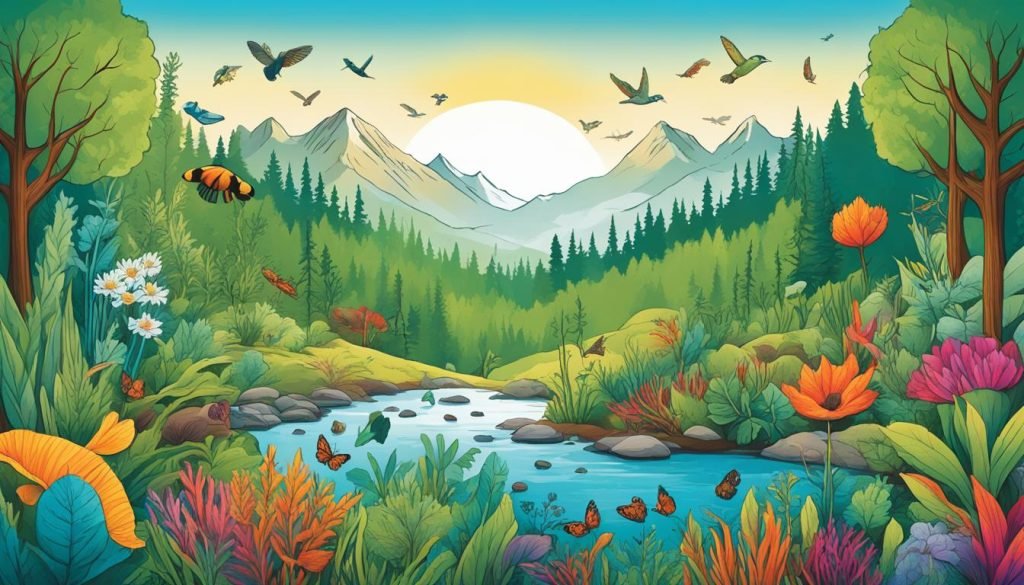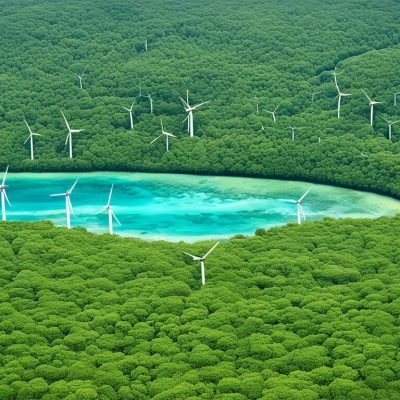Biodiversity is the variety of life on Earth. This includes different species, ecosystems, and genetic diversity. Sadly, human actions like deforestation, pollution, and climate change are harming this variety. This is happening at a fast pace.
To keep ecosystems healthy and ensure our future, we must protect biodiversity. Efforts like creating protected areas, fixing damaged habitats, and using the land wisely are key. They help keep Earth’s natural balance.
Key Takeaways:
- Biodiversity is the variety of species, ecosystems, and genetic diversity on Earth.
- Human activities are threatening biodiversity, including deforestation, pollution, and climate change.
- Preserving biodiversity is essential for ecosystem health and the well-being of future generations.
- Conservation efforts, such as establishing protected areas and restoring habitats, are crucial for safeguarding Earth’s natural heritage.
- Sustainable land management practices play a significant role in biodiversity preservation.
The Importance of Local Biodiversity Conservation
It’s important to protect the variety of plants and animals in a place. This helps keep ecosystems healthy. We also keep the balance of nature intact for the future.
Habitat Protection: Saving local homes of plants and animals is key. It ensures they can live and grow without our impact. We do this by creating safe areas for them.
Species Diversity: Looking after local biodiversity means saving different kinds of life. Each plant and animal is important in keeping nature balanced. Their roles help the whole ecosystem work well.
“The continued existence of wildlife and wilderness is important to the quality of life of humans.”
Ecological Conservation: By protecting local life forms, we help whole ecosystems stay healthy. This gives us clean necessities like air and water. Nature also naturally fights climate change and saves resources for us.
Wildlife Conservation: Local conservation helps keep animals safe. Some creatures need specific areas to live and move. By keeping their homes safe, we ensure their future and help nature stay in balance.
To help, anyone can do these simple things every day:
- Buy food from local farms that care about the environment.
- Grow plants that are natural to your area to help local animals.
- When you go out, respect nature by staying on marked paths.
- Choose products that are kind to the planet. Support green companies.
This way, we all help keep our planet rich in different life forms. It’s a step towards a greener, sustainable tomorrow.
The Alarming Decline of Biodiversity
Biodiversity is facing a critical decline that demands urgent attention. The latest WWF report shows a 69 percent decrease in global populations of animals since 1970[^1^]. One-third of plant species in the U.S. face extinction[^2^]. Human activities like habitat destruction and climate change are the main reasons behind this crisis.
This loss of species and habitats affects Earth’s balance. Biodiversity is vital for ecosystems to work well. It plays a key role in processes like pollination and natural pest control. The extinction of species harms these processes, putting our environment at risk.
Habitat destruction, whether by deforestation, urbanization, or agriculture, is a main cause of biodiversity loss[^3^]. Destroyed habitats mean species can’t find new homes. This makes ecosystems unstable and threatens many species.
“The current rate of extinction is estimated to be 1,000 times higher than the natural background rate, indicating that we are in the midst of the sixth mass extinction event in Earth’s history[^4^].”
Climate change worsens the biodiversity crisis. It leads to extreme weather and changes in ecosystems. This makes it hard for species to adapt. Climate change is also harming critical habitats, putting many species in danger[^5^].
The decline of biodiversity hurts us, too. Healthy ecosystems give us clean air, water, and more. Preserving biodiversity is crucial for these benefits.
Capturing the essence of biodiversity
- Ecosystem resilience: Biodiversity helps ecosystems deal with changes and disturbances.
- Wildlife conservation: Protecting biodiversity means saving various animal and plant species.
- Climate change mitigation: Biodiverse places help reduce greenhouse gas emissions and fight climate change.
- Cultural and aesthetic value: Nature’s variety is important for human culture and creative expressions.
In conclusion, we must act quickly to save biodiversity. Efforts to preserve and conserve are essential. By protecting biodiversity, we protect our planet for future generations.
References:
- WWF. (2022). Living Planet Report 2022.
- NatureServe. (n.d.). Conservation Status Assessment.
- United Nations. (n.d.). Biodiversity and Ecosystem Services.
- IPBES. (2019). Summary for policymakers of the global assessment report on biodiversity and ecosystem services.
- IPCC. (2018). The Intergovernmental Panel on Climate Change Special Report on Global Warming of 1.5°C.
The Benefits of Biodiversity Preservation
Biodiversity preservation helps keep our planet healthy and supports our quality of life. It brings many important advantages. These touch various parts of our daily lives.
1. Ensuring Food Security
Maintaining biodiversity is key to having enough food globally. Plants and animals used in farming need healthy ecosystems to thrive. By keeping biodiversity, our food production remains steady and dependable.
2. Job Creation and Economic Impact
Various sectors like forestry, farming, and medicine depend on biodiversity. They create many jobs and help the economy grow. Biodiversity keeps these industries strong and helps people make a living.
3. Climate Change Resistance
Diverse ecosystems naturally fight the effects of climate change. They soak up carbon dioxide, lowering harmful emissions. By saving biodiversity, we help our environment stay strong against climate challenges.
4. Disease Treatment and Human Protection
Many life-saving medicines come from our biodiversity. Protecting it means keeping these medical resources available. It also helps prevent diseases that jump from animals to people, keeping us safe.

5. Enhancing Human Well-being
Looking after biodiversity does more than protect the environment. It boosts our happiness and mental well-being. Being in nature and seeing different ecosystems can make us feel better. It adds to our life’s joy and brings peace.
By caring for biodiversity, we ensure a bright future. Its advantages range from food safety and jobs to fighting climate change and disease. This shows how important it is for both our planet and ourselves.
Conclusion
Keeping Earth’s many life forms alive is vital for our world to last a long time. We must work to protect and care for the different animals and plants that call our planet home. This way, we can leave behind a better place for those who come after us.
Creating safe zones, fixing environments, and using resources wisely are ways we can help. By doing this, we keep a good relationship between people and nature. This helps keep our Earth healthy and fights the bad effects of climate change.
Looking after animals also plays a big part in saving Earth’s variety of life. By making sure animals have a safe place to live, we keep nature in balance. This is good for both animals and the places they live in.
Everyone has a part to play in saving life on Earth. We can talk about it, support groups that protect nature, and change how we live. Even small steps in our daily lives can add up to a big positive change. This way, we work together to keep our planet safe and healthy for the future.





